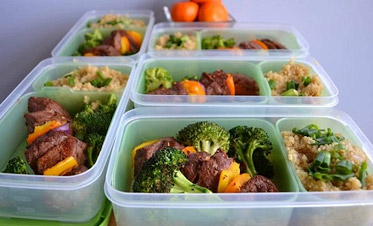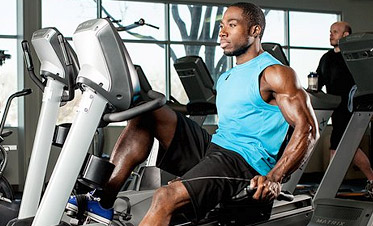DOES PLAYING SPORTS HARM MUSCLE GROWTH? (BODYBUILDING & SPORTS)

Will playing sports throughout the week hurt your muscle gains? Can bodybuilding and sports mix?
In this article, we’re going to discuss how you can successfully combine bodybuilding with playing sports.
Can you still make significant muscle gains if you’re regularly playing sports throughout the week? If so, what’s the best way to combine the two in order to keep your gym progress maximized?
The short answer is that yes, as long as you lay things out properly during the week and make the correct adjustments, you can still build muscle effectively even if you are playing sports regularly.
The specific impact that playing sports will have on your gains (if any) will depend on how strenuous it is, as well as how many total hours per week you’re dedicating to it.
For example, playing a lower intensity sport such as baseball is almost certainly not going to negatively affect your results.
On the other hand, something more demanding such as soccer or hockey several times per week could potentially have a minor effect due to the increased muscular and cardiovascular demand.
High impact sports like football or rugby would be the most likely to interfere with your recovery and overall gains if you don’t follow the proper steps.
In this article I’ll be giving you six tips you can implement to strike the right balance between bodybuilding and sports so that you can build muscle and gain strength while still playing the sports you enjoy.
6 Tips to Combine Bodybuilding And Sports
Tip #1: Ensure You’re Consuming Enough Calories

Tip number one is the most basic and fundamental.
If your goal is to maximize muscle size and strength gains, you need to be consuming enough total calories and eating in a small surplus of about 200-300 above your calorie maintenance level.
Playing strenuous sports throughout the week will result in additional calories being burned and will use up nutritional resources your body needs to recover and grow between weight training sessions.
Make sure to monitor your overall body weight on the scale, and if you find that it’s remaining stagnant from week to week, this is a sure sign that you’re not in a surplus and that your current calorie intake is too low.
The more intense your particular sport is and the more hours you’re devoting to it, the more heavily you’re going to need to adjust your calories in order to compensate.
As a rough estimate, a beginning lifter who is building muscle at an optimal rate without gaining excessive body fat should expect an overall weight gain of around two pounds per month, and no more than three as a maximum.
This rate of weight gain should decrease by about half for every year of proper training after that.
These figures are just rough estimates, but the bottom line is that if the scale isn’t going up, you’re not in a calorie surplus.
If this is the case for you, continue increasing your daily intake by 100-150 calories until the scale begins moving again.
If you’re unsure of how many daily calories you require for muscle growth in the first place, you can use my bodybuilding macronutrient calculator to get an approximate starting point.
Tip #2: Space Your Weight Training And Sports Apart

Tip number two is to try and space your weight training sessions away from the days where you’re playing sport by as much as you reasonably can in order to maximize recovery.
Be sure to take into account the major muscle groups that your particular sport requires when you’re planning your weekly gym schedule.
For example:
- Ideally, you wouldn’t want to go rock climbing or do an intense rowing session right before or after a back workout since both involve a lot of pulling movements.
- You’d probably want to try and schedule your leg workouts further away from a sport that involves a lot of running or jumping.
- Try to space your chest workouts away from something like boxing which involves a lot of upper body pushing.
The primary goal here is to give the muscles that are being worked as much recovery time as possible.
Everyone’s schedule is a bit different, but just do the best you can to separate things throughout the week in order to minimize overlap between your chosen sport(s) and bodybuilding training sessions.
Tip #3: Reduce Or Eliminate Additional Cardio Exercise

Tip number three is to scrap any extra gym cardio you might be doing.
If you’re trying to build muscle and gain strength as efficiently as possible, there’s no reason for you to be performing additional cardio in the gym if you’re already playing sports multiple times per week. This is one of many important cardio mistakes to avoid.
Instead, just treat your sports as your method of cardio exercise.
Any physical activity that gets your heart rate and breathing up over a sustained period will ultimately be an effective form of cardio.
Trying to combine weight training, gym cardio and sports throughout the week may result in too much overall stress on your body that interferes with your ability to recover and grow.
Tip #4: Decrease Weight Training Volume And/Or Frequency

Tip number four is to cut down your overall weight training volume and frequency if you’re dedicating a lot of time and effort (4 days or more per week) towards your chosen sport.
This will help to ensure that you don’t overtrain yourself. (Yes, overtraining is real.)
For example, someone who was trying to do MMA training four days per week while also training with weights five days per week would likely be doing too much total work for optimal gains.
Keep in mind that muscle growth takes place while you’re out of the gym resting. The work you perform in the gym is simply the “spark” that sets things into motion, but it’s the process of recovery that actually produces the growth itself. If you can’t adequately recover, you can’t grow.
If you’re regularly playing strenuous sports, you’ll probably be best off to cut your weight training sessions down to no more than four sessions per week. Three sessions would be even better for most natural lifters.
If you’re going to the gym three days per week but are still having issues with recovery, the next step would be to cut back on the actual volume per session by performing fewer total sets. Start with roughly a 20% overall decrease and go from there.
Lastly, you could also reduce the frequency in terms of how often you train each individual muscle group.
For example, instead of training each muscle twice per week, you could instead reduce this to once every 4-5 days, or even just once per week.
While this won’t be optimal for producing the very fastest gains, you’ll still achieve significant growth over time as long as you train with sufficient intensity and focus on progressive overload.
Tip #5: Decrease Sports Volume/Frequency

Tip number five is to decrease the total volume and frequency of your sports sessions.
If playing sports is something you just do for casual fun and bodybuilding is a higher priority, cutting back slightly on your sports frequency could help to optimize your gains if it’s something you’re doing very often throughout the week.
Overall, this just comes down to personal preference and one’s individual goals.
I wouldn’t recommend completely ditching a hobby that you find enjoyable purely for the sake of bodybuilding, however, if this hobby is decreasing your ability to progress in the gym, then cutting back a bit could be a viable option.
For example, instead of playing sports five days per week you could try cutting it down to three.
Or, if you’re already playing sports three times per week but it’s for three hours per session, you could cut back the duration to one or two hours instead.
Remember, your first priority as a bodybuilder or athlete is to reduce your risk for injury.
Tip #6: Optimize Your Sleep

Tip number six is to make sure that you’re sleeping well each night.
Sleep is critically important no matter what type of training you’re doing, but even moreso if you’re playing sports and lifting weights regularly.
Being chronically sleep-deprived interferes with virtually every process related to recovery and growth and will make consistently keeping up with both sports and bodybuilding very difficult to do.
Some important bodybuilding sleep tips include:
- Maintaining a consistent schedule by going to sleep and waking up at the same time each day.
- Avoiding work or other “mind stimulating” activities in bed.
- Cutting off all electronics 30-60 minutes prior to sleep.
- Not going to bed too full or too hungry.
- Keeping your room cool (between 60-67 degrees) and as dark as possible.
- Eliminating sudden background noises by sleeping in total silence or using white noise.
- Avoiding caffeine and other stimulants within 6-8 hours of sleep.
Summary
If you want to combine bodybuilding and sports, it’s definitely doable in most cases. You can still build muscle and gain strength effectively as long as you follow the steps outlined in this article.
It’s possible that your gains may still be slightly affected even if you do follow them, but these tips will help to ensure that any negative impact your chosen sports have on your gains is fully minimized.
For those who aren’t training to be as big and strong as possible and just want to build a decent all-round physique, playing sports and bodybuilding will likely be a non-issue altogether.
Here’s a quick summary of the key points outlined in this article:
- Adjust your calorie intake to compensate for the increased calories burned from playing sports.
- Space your sports and weight training sessions apart as much as you can.
- Reduce or completely eliminate additional gym cardio.
- If necessary, cut back on your weight training volume and frequency.
- The other option is to cut back on the volume and frequency of the sports you’re playing.
- Make sure that you’re sleeping well each night.
If you found this article helpful, make sure to sign up for your FREE custom fitness plan below...




